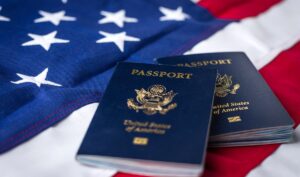
The widow of a U.S. citizen may apply for a green card and even obtain U.S. citizenship. U.S. immigration law accommodates situations where the U.S. citizen spouse dies before the foreign national spouse may apply for permanent residence (green card). And after a statutory period, permanent residents may generally apply for citizenship.
Marriage to a U.S. citizen does not automatically make a foreign national a U.S. citizen. There is a process. Fortunately, this process is available even if the U.S. citizen has passed away.
If you were married to a U.S. citizen who passed away before you obtained a green card, there is a path to residence and citizenship. As the widow(er) of a U.S. citizen you can apply for a green card and then become a U.S. citizen through the naturalization process.
Applying for a Green Card as the Widow(er) of a U.S. Citizen
There are essentially two ways that the widow of a U.S. citizen can apply for permanent resident status. It depends if that U.S. citizen spouse had already filed a petition on your behalf before his or her death. There’s actually a third path to recognize the sacrifices of widow(ers) of U.S. service members killed in combat.
Pending or Approved Petition
If you were married to a U.S. citizen who filed Form I-130 (Petition for Alien Relative) for you before he or she died, you do not need to file a separate petition. The Form I-130 will be automatically converted to a Form I-360 (Petition for Amerasian, Widow(er), or Special Immigrant). If you have children (unmarried and under age 21), they may be included on the Form I-360 regardless of whether your deceased spouse had filed a petition for them.
If you separated from your spouse before death, you are not eligible. To qualify, you must not have been divorced or legally separated from the U.S. citizen at the time of death. Additionally, your eligibility to immigrate as a widow(er) ends if you have remarried.
No Previous Petition
If your U.S. citizen never filed Form I-130 for you, there is still a path to a green card. You can self-petition as an “immediate relative” on Form I-360, Petition for Amerasian, Widow(er), or Special Immigrant.
To qualify, you must not have been divorced or legally separated from the U.S. citizen at the time of death. Also, your eligibility to immigrate as a widow(er) ends if you have remarried. You must file the I-360 petition within two years of the citizen’s death.
Military Widow(ers)
For surviving spouses of deceased U.S. military members who were killed in combat, there are separate immigration benefits. Military widow(ers) who meet certain requirements may self-petition for immediate relative status on Form I-360.
For more information and possible resources to help you claim these benefits, contact USCIS. They established a toll-free military help line, 877-CIS-4MIL (877-247-4645) exclusively for current members of the military and their families.
Eligibility for a Widow or Widower to Obtain a Green Card
In summary, a widow or a widower may be eligible to apply for permanent residence in the United States if that applicant:
- Was married to a U.S. citizen at the time that same citizen passed away;
- Has a pending or approved Form I-130 or files Form I-360 within 2 years of the U.S. citizen spouse’s death;
- Has not remarried;
- Was not divorced or legally separated from the U.S. citizen spouse at the time he or she died;
- Is able to prove that he or she was in a bona fide marital relationship until the time of your spouse’s death; and
- Is admissible to the United States.
Children of the Widow(er)
In most cases, the children of a U.S. citizen parent are automatically U.S. citizens. If the child is born abroad, you’ll likely need to contact the closest U.S. embassy to obtain documentary proof in the form of a Consular Report of Birth Abroad.
However, the U.S. citizen’s step children will also typically qualify for permanent resident status. It’s important to note that in order to be a legal step child, the parents must marry before the child turns 18. Unmarried children under the age of 21 will qualify as “derivatives” on the parent’s green card petition.
As immediate relatives, your derivative children are granted benefits of the Child Status Protection Act, which “freezes” their ages as of the date of the principal’s filing of Form I-130 or I-360, whichever is applicable. This provision prevents them from aging-out if they turn 21 prior to an approval of their green card application. They must, however, continue to meet any other additional filing requirements.
RECOMMENDED: Aging Out and How the Child Status Protection Act Helps
Applying for Citizenship the Widow or Widower of a U.S. Citizen
Typically, the permanent resident spouse of a U.S. citizen qualifies for U.S. citizenship after just three years with continuous residence in the United States. This provision in the law gives spouses of U.S. citizens a fast path to naturalize as compared to typical applicants (who apply on the basis of five years continuous residence).
However, it the U.S. citizen spouse dies at any point before the permanent resident naturalizes, the three-year provision no longer applies. For this reason, the widow or widower of a U.S. citizen may generally apply for citizenship after five years only.
If you’re a widow(er) of a U.S. citizen, you can likely naturalize as a citizen of the United States once you satisfy all of the following requirements:
- Are at least 18 years old
- Lived within the same state for at least 3 months before filing the application
- Met the 5-year continuous residence requirement
- Met the 30-month physical presence requirement
- Able to pass the English test as well as U.S. civics test
- Is a person of good moral character
To apply for citizenship, you’ll need to file Form N-400 (Application for Naturalization). For a more detailed description of these criteria, see the citizenship requirements.
About CitizenPath
CitizenPath provides simple, affordable, step-by-step guidance through USCIS immigration applications. Individuals, attorneys and non-profits use the service on desktop or mobile device to prepare immigration forms accurately, avoiding costly delays. CitizenPath allows users to try the service for free and provides a 100% money-back guarantee that USCIS will approve the application or petition. We provide support for the Application for Naturalization (Form N-400), Application for Certificate of Citizenship (Form N-600), and several other immigration services.
Want more immigration tips and how-to information for your family?
Sign up for CitizenPath’s FREE immigration newsletter and
SAVE 10%
on our immigration services



